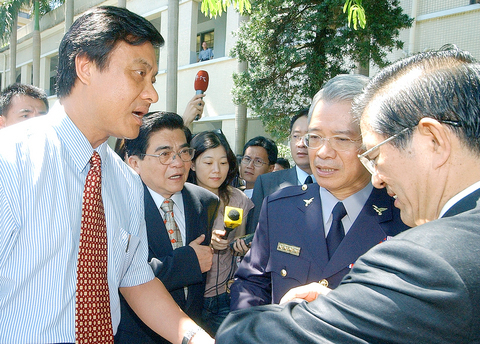Minister of the Interior Su Jia-chyan (蘇嘉全), Minister of Justice Morley Shih (施茂林), State Public Prosecutor-General Wu Ying-chao (吳英昭) and National Police Agency Director-General Shieh Ing-dan (謝銀黨) yesterday launched a new anti-gang program as the government seeks to relentlessly crack down on the nation's criminal underworld.
The announcement comes after a victory for law enforcement officials after the arrest of the notorious kidnap-for-ransom gangster Chang Hsi-ming (張錫銘) on Wednesday.
The initiative, called Chihping Anti-Gangster Program (治平專案), is a large-scale project that will crack down on organized crime.

PHOTO: LIU HSIN-DE, TAIPEI TIMES
"The project will take aim at five types of organized crime activity," Shih said. "These include groups which take advantage of legal businesses to cover their illegal activities; violent debt collectors; elected officials with underworld connections; politicians who ask for kickbacks or are involved illegal activities surrounding the major construction projects; and international crime rings that operate on either side of the Taiwan Strait."
According to Shih, Chang and his associates belong in the last category, but police have yet to determine who was the mastermind behind the infamous kidnap-for-ransom network.
"Our investigation showed that crime rings assign detailed tasks to each of its members. Everyone in the group is involved in a portion of a crime. As a result, it also takes more time for officers to locate and arrest all the people involved," Shih said.
Su said that even though the arrest of Chang and several of his fellow gang members was a victory for the fight against organized crime, the investigation into the nation's most-wanted criminal continues.
"In Chang's case, we have arrested 52 gang members, seized 38 assault rifles, submachine guns and pistols, 1,700 rounds of ammunition and body armor," Su said.
"But this is not good enough, so we have to come up with more relevant leads and keep fighting against the criminals," he added.
According to the interior minister, the investigation also revealed that some of Chang's accomplices have fled to China.
"No matter where they are hiding, we will do our best to bring them back to Taiwan for trial and punishment, even if they are hiding in China," Su said.
Shih also announced that Prosecutor-General Wu was assigned to lead the anti-gang initiative.
In the past, if a gang member was arrested by police during a special crackdown drive, they were taken to the prison on Green Island and usually detained indifinitely without charge or trial.
However, the Green Island Prison was decommissioned in 2002 and all its inmates were moved to prisons in Hualien and Taitung.
"In the future, whoever is arrested in an anti-gang drive will be detained in local detention jails and officers will carry out their jobs in a professional manner," Wu said.

An essay competition jointly organized by a local writing society and a publisher affiliated with the Chinese Communist Party (CCP) might have contravened the Act Governing Relations Between the People of the Taiwan Area and the Mainland Area (臺灣地區與大陸地區人民關係條例), the Mainland Affairs Council (MAC) said on Thursday. “In this case, the partner organization is clearly an agency under the CCP’s Fujian Provincial Committee,” MAC Deputy Minister and spokesperson Liang Wen-chieh (梁文傑) said at a news briefing in Taipei. “It also involves bringing Taiwanese students to China with all-expenses-paid arrangements to attend award ceremonies and camps,” Liang said. Those two “characteristics” are typically sufficient

A magnitude 5.9 earthquake that struck about 33km off the coast of Hualien City was the "main shock" in a series of quakes in the area, with aftershocks expected over the next three days, the Central Weather Administration (CWA) said yesterday. Prior to the magnitude 5.9 quake shaking most of Taiwan at 6:53pm yesterday, six other earthquakes stronger than a magnitude of 4, starting with a magnitude 5.5 quake at 6:09pm, occurred in the area. CWA Seismological Center Director Wu Chien-fu (吳健富) confirmed that the quakes were all part of the same series and that the magnitude 5.5 temblor was

The brilliant blue waters, thick foliage and bucolic atmosphere on this seemingly idyllic archipelago deep in the Pacific Ocean belie the key role it now plays in a titanic geopolitical struggle. Palau is again on the front line as China, and the US and its allies prepare their forces in an intensifying contest for control over the Asia-Pacific region. The democratic nation of just 17,000 people hosts US-controlled airstrips and soon-to-be-completed radar installations that the US military describes as “critical” to monitoring vast swathes of water and airspace. It is also a key piece of the second island chain, a string of

The Central Weather Administration has issued a heat alert for southeastern Taiwan, warning of temperatures as high as 36°C today, while alerting some coastal areas of strong winds later in the day. Kaohsiung’s Neimen District (內門) and Pingtung County’s Neipu Township (內埔) are under an orange heat alert, which warns of temperatures as high as 36°C for three consecutive days, the CWA said, citing southwest winds. The heat would also extend to Tainan’s Nansi (楠西) and Yujing (玉井) districts, as well as Pingtung’s Gaoshu (高樹), Yanpu (鹽埔) and Majia (瑪家) townships, it said, forecasting highs of up to 36°C in those areas